In a world where sexual performance and satisfaction play a crucial role in maintaining relationships and self-esteem, Viagra has emerged as a game-changer for individuals dealing with erectile dysfunction. While most people are familiar with the standard 50 mg dose, there are higher-strength options like Viagra 200 mg that offer even more potency. In this comprehensive guide, we will explore everything you need to know about Viagra 200 mg, including its uses, benefits, potential risks, and alternatives.
Understanding Erectile Dysfunction
Erectile dysfunction (ED), also known as impotence, is a common medical condition that affects millions of men worldwide. It is characterized by the inability to achieve or maintain an erection sufficient for sexual intercourse. There can be various causes of ED, including psychological factors, lifestyle choices, and underlying medical conditions.
The Role of Viagra
Viagra, the brand name for sildenafil, is one of the most well-known and widely prescribed medications for ED. It belongs to a class of drugs called phosphodiesterase type 5 (PDE5) inhibitors. Viagra works by relaxing the blood vessels in the penis, allowing more blood to flow in, which in turn facilitates the attainment and maintenance of an erection. The standard dose of Viagra is 50 mg, taken as needed approximately 30 minutes to one hour before sexual activity.
When is Viagra 200 mg Prescribed?
Viagra 200 mg is the highest available dose of sildenafil. It is typically prescribed for men who have tried lower doses of Viagra (50 mg or 100 mg) and found them to be less effective in achieving the desired results. There are several reasons a healthcare provider may prescribe Viagra 200 mg:
- Tolerance: Some individuals may build up a tolerance to lower doses of Viagra over time, requiring a higher dose to achieve the desired effect.
- Severe ED: Men with severe or advanced ED may need a higher dose of medication to experience the benefits.
- Underlying Conditions: Certain medical conditions, such as diabetes or cardiovascular diseases, can make it more challenging for the body to respond to lower doses of Viagra.
- Individual Response: Everyone’s body is different, and some individuals may simply respond better to the 200 mg dose.
- Psychological Factors: Anxiety, performance pressure, and stress can impact the effectiveness of lower doses of Viagra. In such cases, a higher dose may be recommended.
Benefits of Viagra 200 mg
Taking Viagra 200 mg offers several potential benefits:
- Increased Efficacy: The higher dose of Viagra can be more effective for men who have not achieved the desired results with lower doses.
- Improved Confidence: Knowing that they have a higher-strength option can boost the confidence of men dealing with severe ED.
- Longer Duration: Viagra 200 mg may provide a longer duration of action, allowing for a more extended period of sexual activity.
- Quick Onset: Just like the standard dose, Viagra 200 mg generally starts working within 30 minutes to an hour after consumption.
Side Effects of Viagra 200mg
While Viagra 200 mg can be highly effective, it is important to be aware of potential risks and side effects associated with this higher dose. Common side effects of Viagra, regardless of the dosage, can include:
- Headaches
- Flushing
- Upset stomach
- Nasal congestion
- Back pain
- Muscle pain
- Dizziness
In some cases, these side effects may be more pronounced with a higher dose. Additionally, there are potential risks associated with taking a higher amount of sildenafil, including:
- Cardiovascular Risks: Viagra, especially in higher doses, can affect blood pressure. Individuals with pre-existing cardiovascular conditions should consult with a healthcare professional before taking a higher dose.
- Priapism: Priapism is a rare but serious side effect where the erection does not subside after several hours. It requires immediate medical attention.
- Drug Interactions: Viagra can interact with certain medications, potentially leading to adverse effects. It’s essential to inform your healthcare provider about all medications you are taking.
- Allergic Reactions: Some individuals may be allergic to sildenafil, which can lead to severe allergic reactions. If you experience symptoms like hives, difficulty breathing, or swelling of the face, seek emergency medical attention.
Precautions and Consultation
Before considering Viagra 200 mg, it is crucial to consult with a healthcare provider. Your doctor can assess your specific needs, medical history, and any potential risk factors. They will consider whether the higher dose is appropriate for you or if there are alternative treatment options that might be more suitable.
Some precautions to keep in mind when considering Viagra 200 mg:
- Medical History: Inform your healthcare provider about your medical history, especially if you have a history of heart problems, stroke, or allergic reactions.
- Medications: Discuss all medications you are taking, including over-the-counter drugs and supplements, as they may interact with sildenafil.
- Dosage Adjustment: Your doctor may start you on a lower dose of Viagra and adjust it as needed.
- Monitoring: Regular check-ups with your healthcare provider can help monitor your progress and address any concerns or side effects.
How does Viagra 200mg works?
Viagra 200 mg, like its lower-dose counterparts, works as a phosphodiesterase type 5 (PDE5) inhibitor to address erectile dysfunction (ED). It contains the active ingredient sildenafil, which exerts its effects by enhancing the body’s natural processes that lead to an erection.
When a man becomes sexually aroused, the body releases nitric oxide, a chemical messenger that signals the smooth muscle cells in the blood vessels of the penis to relax. This relaxation allows these blood vessels to dilate, increasing blood flow into the erectile tissues, which leads to an erection. However, in individuals with ED, this process is disrupted, and the blood vessels do not dilate sufficiently.
Viagra 200 mg steps in to rectify this by inhibiting the action of the PDE5 enzyme. PDE5 is responsible for breaking down cyclic guanosine monophosphate (cGMP), a chemical that plays a crucial role in maintaining the dilation of the penile blood vessels. By inhibiting PDE5, Viagra 200 mg ensures that cGMP levels remain elevated in the penis, promoting sustained relaxation of the blood vessels. This, in turn, allows for increased blood flow, resulting in a firm and lasting erection when sexual arousal occurs.
It’s important to note that the effects of Viagra 200 mg are reliant on sexual stimulation; it does not induce an automatic erection. Instead, it enhances the natural response to sexual arousal, helping men with ED achieve and maintain an erection, thus improving their ability to engage in satisfying sexual activity. However, the higher dose comes with an increased potential for side effects and interactions, so it should only be used under the guidance and supervision of a healthcare professional.
Alternatives to Viagra 200 mg
If you and your healthcare provider decide that Viagra 200 mg is not the best option for you, there are several alternatives to consider:
- Lower-Dose Viagra: Some individuals may achieve the desired results with lower doses, such as 50 mg or 100 mg.
- Other PDE5 Inhibitors: There are alternative medications in the same class as Viagra, including Cialis (tadalafil) and Levitra (vardenafil). These drugs may work for individuals who do not respond well to sildenafil.
- Lifestyle Changes: Improving your overall health through diet, exercise, and stress management can have a positive impact on ED.
- Psychological Counseling: In cases where psychological factors play a significant role in ED, therapy or counseling may be beneficial.
- Vacuum Erection Devices: These non-pharmacological devices can help achieve and maintain an erection.
- Surgery: In some cases, surgical options, such as penile implants, may be considered as a last resort.
Who should avoid taking this tablet?
- If you have a history of heart problems, such as angina, heart attack, or arrhythmias, it’s essential to avoid Viagra 200 mg as it can affect blood pressure and cardiovascular function.
- Those with low blood pressure (hypotension) should steer clear of this high-dose medication, as it can exacerbate low blood pressure issues.
- If you have a known allergy to sildenafil or any of the medication’s components, you should not take Viagra 200 mg due to the risk of severe allergic reactions.
- If you are currently using nitrate medications, commonly prescribed for chest pain (angina), combining them with Viagra 200 mg can lead to dangerous drops in blood pressure.
- Certain medications for prostate conditions, known as alpha-blockers, can interact with Viagra 200 mg, potentially causing adverse effects.
- Individuals with severe liver or kidney impairment may not be suitable candidates for this higher dose, as it can affect the drug’s metabolism and clearance from the body.
- It’s crucial to consult with a healthcare provider to review all medications and potential interactions, as some drugs can interact adversely with sildenafil.
- If you have a history of priapism (prolonged, painful erections), Viagra 200 mg may not be advisable due to the increased risk of this condition.
Viagra 200mg work more than once
Each has a different bodily state from one another. However, depending on the person’s endurance, it is feasible. The number of times you can come before the drug wears off is only dependent on your degree of arousal.
According to your age, general health, and what’s in your stomach when you take it, your doctor might advise it. The effects of 200 mg of Viagra can last up to 4 hours, however many users report that they start to wear off after 2 or 3 hours. Depending on your situation, the doctor might advise you over the course of a few weeks or months.
Factors affecting intake of Viagra tablets
Several factors can affect the intake of Viagra (sildenafil) tablets, which are commonly used to treat erectile dysfunction. It’s crucial to consider these factors to ensure the safe and effective use of the medication.
- Medical Assessment: Consultation with a healthcare provider is essential to determine whether Viagra is suitable for the individual. Underlying medical conditions, medications, and allergies must be taken into account.
- Dosage: Viagra comes in various strengths (25mg, 50mg, and 100mg). The appropriate dosage is determined by the severity of the erectile dysfunction and the individual’s response to the medication.
- Timing: Viagra is typically taken 30 minutes to 1 hour before sexual activity. The timing can affect how well the drug works, as it needs time to become effective.
- Diet: High-fat meals can delay the onset of Viagra’s effects. It’s generally recommended to take the medication on an empty stomach for quicker absorption.
- Alcohol and Drug Interaction: Alcohol and recreational drugs can interact with Viagra, potentially reducing its effectiveness or causing adverse effects. Avoiding or limiting these substances is advisable.
- Health Status: Health conditions such as cardiovascular issues or liver/kidney problems can influence how Viagra is metabolized and its safety. A thorough medical evaluation is essential.
- Age: Age-related factors may affect the response to Viagra. Older individuals may require different dosages due to changes in metabolism.
- Psychological Factors: Psychological issues, like anxiety or relationship problems, can impact the response to Viagra. Addressing these factors in conjunction with medication may be necessary.
- Side Effects: Awareness of potential side effects, such as headaches, flushing, or vision changes, is crucial. Understanding these side effects can help users make informed decisions about medication intake.
- Storage and Safety: Viagra should be stored as directed, away from moisture and heat, and out of the reach of children. Safeguarding the medication is important.
- Regular Follow-up: Periodic follow-up with a healthcare provider is important to monitor the efficacy and safety of Viagra and make necessary dosage adjustments.
- Alternative Treatments: Individuals should discuss alternative treatments with their healthcare provider if Viagra is ineffective or unsuitable.
Strength of Viagra tablet
Viagra (sildenafil) tablets come in three main strengths: 25mg, 50mg, and 100mg. The choice of strength is based on individual factors and the severity of erectile dysfunction.
- 25mg: This is the lowest strength and is often prescribed for individuals who are more sensitive to the medication or have mild erectile dysfunction. It’s also recommended for older adults or those with certain medical conditions that may increase their sensitivity to the drug. It is less likely to cause side effects but may be less effective for some.
- 50mg: This is the standard starting dose for most men. It offers a balance between effectiveness and minimizing side effects. Many people find this dosage to be suitable for their needs.
- 100mg: This is the highest strength and is typically prescribed when the lower strengths are not producing the desired results. It’s important to note that a higher dosage can increase the risk of side effects, so it should be used under careful medical supervision.
Points to emphasize regarding Viagra tablet
Viagra, the brand name for the drug sildenafil, is a medication primarily designed to treat erectile dysfunction, a common condition affecting many men. When discussing Viagra, several key points should be emphasized to ensure its safe and effective use.
First and foremost, Viagra should only be taken under the guidance of a qualified healthcare professional. It’s essential to stress the importance of a thorough medical assessment before starting the medication. This assessment takes into account the individual’s medical history, current medications, and any underlying health conditions that may affect the safety and efficacy of Viagra. The healthcare provider will also determine the appropriate dosage strength, typically starting with 50mg, which can be adjusted based on the individual’s response.
Timing is critical when taking Viagra. The medication should be consumed approximately 30 minutes to 1 hour before sexual activity. It’s not an aphrodisiac, so sexual stimulation is still necessary to achieve an erection. Informing users about the necessity of planning sexual activity within this timeframe is crucial for its effectiveness.
Discussing potential side effects is vital to ensure users are aware of what to expect. Common side effects may include headaches, flushing, nasal congestion, and digestive issues. More severe side effects are rare but possible and should be reported to a healthcare provider immediately. Users should also be cautious about potential drug interactions, especially with nitrates and certain recreational drugs, as these can lead to serious health complications.
Viagra does not protect against sexually transmitted infections or serve as contraception. Therefore, emphasizing the importance of other safe sex practices is essential.
Moreover, users should be informed about the limitations of Viagra. It does not address the root causes of erectile dysfunction and may not work for everyone. Discussing alternative treatment options, such as lifestyle changes, counseling, or other medications, is crucial for comprehensive care.
Lastly, proper storage, dosage, and adherence to doctor instructions are necessary for the medication’s success. It’s crucial to store Viagra in a cool, dry place and out of the reach of children.
The maximum dose of Viagra 200mg
The maximum recommended dose of Viagra (sildenafil) was typically 100mg. However, please note that dosages may vary based on individual health and medical recommendations. A healthcare provider may, in certain cases, prescribe a 200mg dose if they believe it’s necessary, but such a decision should only be made under their careful supervision due to an increased risk of potential side effects at higher doses. Exceeding the prescribed dose without medical approval is not advisable. To ensure the most accurate and up-to-date information on Viagra dosages, it’s crucial to consult a healthcare professional or refer to the latest prescribing guidelines.
Correct way to store Viagra tablet
The correct way to store Viagra (sildenafil) tablets is crucial to ensure their efficacy and safety. Store them at room temperature, ideally between 59°F (15°C) and 86°F (30°C), avoiding extreme temperatures. Protect the medication from moisture by storing it in a dry place, away from areas with high humidity, such as bathrooms. It’s essential to shield the tablets from direct sunlight or strong UV light, which can degrade the active ingredients. Keep them in their original packaging or container to safeguard against external elements and to ensure proper identification.
To prevent accidental ingestion, store Viagra out of the reach of children and pets, preferably on a high shelf or in a locked medicine cabinet. Do not split the tablets unless advised by your healthcare provider, as this may affect their effectiveness. Always check the expiration date on the packaging and refrain from using Viagra tablets that have passed their expiry date. By adhering to these storage recommendations, you can help maintain the medication’s potency and safety throughout its shelf life. If you have any concerns or questions about storing or using Viagra, it’s advisable to consult your healthcare provider or pharmacist for further guidance.
FAQ on Viagra 200mg tablet
1. What is Viagra, and what is it used for?
Viagra is a brand name for the drug sildenafil. It’s primarily used to treat erectile dysfunction (ED) in men, a condition where individuals have difficulty achieving or maintaining an erection during sexual activity.
2. How does Viagra work?
Viagra works by increasing blood flow to the penis, helping men with ED achieve and sustain an erection when sexually aroused.
3. What is the recommended dosage of Viagra?
The usual starting dose is 50mg, taken about 30 minutes to 1 hour before sexual activity. The dosage can be adjusted based on individual response and tolerability, ranging from 25mg to 100mg.
4. How long does Viagra last?
The effects of Viagra typically last for about 4-6 hours, but this can vary among individuals. It doesn’t result in a constant or spontaneous erection; sexual stimulation is still necessary.
5. Are there any side effects of Viagra?
Common side effects include headache, flushing, nasal congestion, and digestive issues. More severe side effects are rare but possible. Consult a healthcare provider if any concerning side effects occur.
6. Can women take Viagra?
Viagra is not approved for use in women. There are different medications available to treat sexual dysfunction in women.
7. Can I take Viagra with alcohol or food?
Taking Viagra with a high-fat meal can delay its effectiveness. Alcohol should be consumed in moderation, as excessive alcohol can reduce the medication’s efficacy and increase the risk of side effects.
8. Is Viagra safe for everyone?
Viagra may not be safe for individuals with certain medical conditions or those taking specific medications. A healthcare provider should evaluate an individual’s health before prescribing Viagra.
9. Can I get Viagra without a prescription?
No, Viagra is a prescription medication, and it should only be obtained with a prescription from a licensed healthcare provider.
10. Is there a generic version of Viagra?
Yes, generic versions of Viagra (sildenafil) are available, which contain the same active ingredient and have similar effectiveness but are often more affordable.
11. What should I do if Viagra doesn’t work for me?
If Viagra is ineffective, consult your healthcare provider. They can adjust the dosage, explore alternative treatments, or investigate underlying causes of erectile dysfunction.
12. How should I store Viagra?
Store Viagra at room temperature, away from moisture and heat. Keep it out of reach of children.




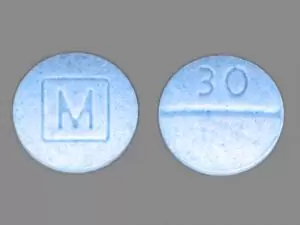
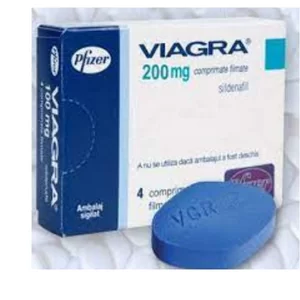
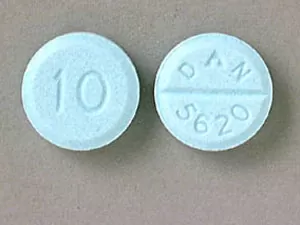
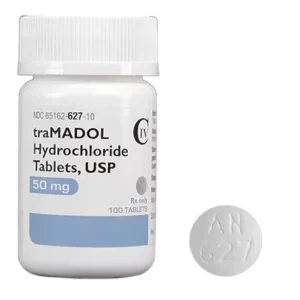
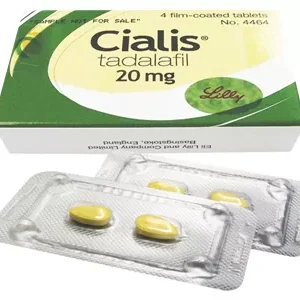

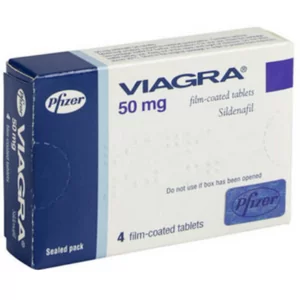

Reviews
There are no reviews yet.